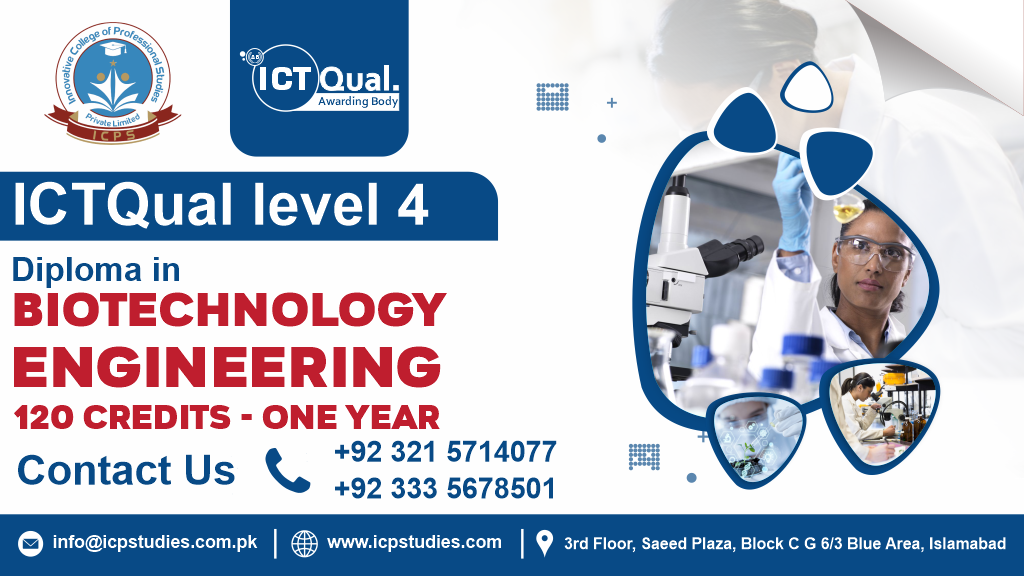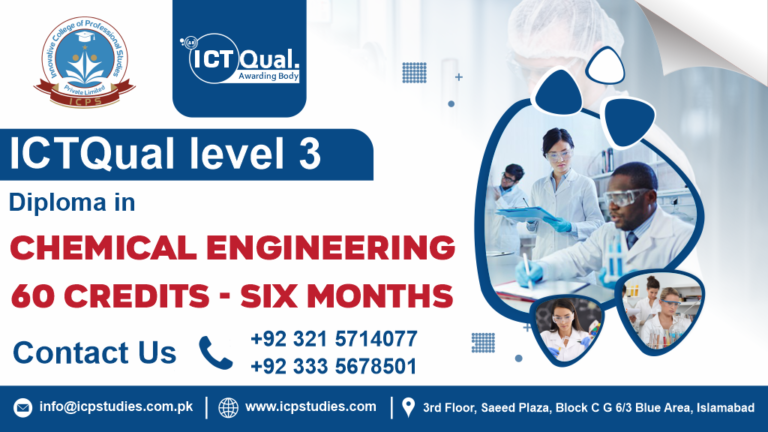The ICTQual Level 4 Diploma in Biotechnology Engineering is a dynamic and intensive one-year course designed for those eager to build or advance their careers in the rapidly growing field of biotechnology. Offering 120 credits, this course provides an in-depth understanding of the principles, applications, and innovations driving the biotechnology industry. From healthcare to agriculture, environmental science, and pharmaceuticals, biotechnology engineers are at the forefront of technological advancements that shape the future.
The ICTQual Level 4 Diploma in Biotechnology Engineering focuses on providing a comprehensive education in both biotechnology and engineering principles. Through a combination of theoretical knowledge and practical application, the course covers a wide range of topics such as genetic engineering, bioprocessing, biotechnology equipment, and sustainable solutions for various industries. You’ll explore the principles of biotechnology, understand its real-world applications, and gain the skills needed to design and manage biotechnological systems.
The ICTQual Level 4 Diploma in Biotechnology Engineering offers an exceptional opportunity for individuals looking to advance or start their careers in the ever-growing biotechnology field. With a solid foundation in both biotechnology and engineering, hands-on learning experiences, and an industry-recognized qualification, this course will equip you with the skills necessary to make a real impact in fields such as healthcare, agriculture, and environmental science. Whether you’re a school leaver, a career changer, or a professional looking to expand your knowledge, this diploma can help you unlock exciting career opportunities in biotechnology engineering.
All About ICTQual Level 4 Diploma in Biotechnology Engineering 120 Credits – one year
Course Overview
The ICTQual Level 4 Diploma in Biotechnology Engineering is a comprehensive one-year program designed to equip learners with advanced knowledge and practical skills in the rapidly evolving biotechnology industry. With 120 credits of study, this course bridges the gap between biotechnology and engineering, preparing you for high-level roles in research, development, and application of biotechnological processes across various industries, including healthcare, agriculture, pharmaceuticals, and environmental science.
Throughout this program, you will gain a deep understanding of the fundamental principles of biotechnology and engineering, as well as the technical expertise required to design, optimize, and manage biotechnological systems. From genetic engineering and bioprocessing to laboratory techniques and sustainability practices, this diploma provides a solid foundation for a successful career in the biotechnology field.
Whether you are a recent graduate looking to enter the biotechnology sector or a professional seeking to expand your expertise, the ICTQual Level 4 Diploma in Biotechnology Engineering offers the ideal pathway to advance your career and contribute to innovative solutions in biotechnology.
Study Units
- Introduction to Biotechnology
- Bioprocess Engineering Fundamentals
- Cell Biology and Genetics
- Microbial Biotechnology
- Biochemical Engineering
- Laboratory Techniques in Biotechnology
- Bioinformatics and Computational Biology
- Genetic Engineering and Biotechnology Applications
- Bioengineering Principles
- Environmental Biotechnology
- Industrial Biotechnology
- Project Management in Biotechnology
To be eligible for the ICTQual Level 4 Diploma in Biotechnology Engineering, applicants must meet the following entry requirements:
- Educational Background:
- A Level 3 qualification in biotechnology, engineering, science, or a related field is required. This could include qualifications such as:
- A Level 3 Diploma in Biotechnology, Engineering, or Science.
- A Level 3 BTEC National Certificate or Extended Diploma in a relevant subject.
- An equivalent qualification from a recognized educational institution.
- A Level 3 qualification in biotechnology, engineering, science, or a related field is required. This could include qualifications such as:
- Relevant Industry Experience (Optional but beneficial):
- Applicants with relevant work experience in biotechnology or engineering may be considered, even if they do not meet the formal academic qualifications. Demonstrated interest or experience in the field can strengthen your application.
- Mathematics and Science Knowledge:
- A strong understanding of basic mathematics and science (especially biology and chemistry) is important, as the course includes technical and theoretical elements that require these skills.
- English Proficiency:
- A good command of the English language is essential, both for understanding the course materials and for successful communication in assignments and assessments. This may be evidenced by a minimum of IELTS 6.0 or an equivalent English qualification.
- Personal Attributes:
- An interest in biotechnology and engineering, along with a desire to learn and apply innovative techniques and technologies, will support your success in the course.
If you do not meet all the above criteria but have relevant experience, we encourage you to contact the admissions team to discuss your eligibility. This qualification is designed to support individuals who are passionate about the biotechnology field and eager to develop both theoretical and practical expertise in this dynamic industry.
The ICTQual Level 4 Diploma in Biotechnology Engineering is designed for individuals who are eager to build or advance their careers in the rapidly growing biotechnology industry. This course is ideal for:
- School Leavers and Recent Graduates:
- If you’ve recently completed your secondary education or a Level 3 qualification in science, engineering, or biotechnology, this course offers a perfect stepping stone to a career in biotechnology engineering. It provides the essential skills and knowledge needed to thrive in the industry.
- Career Changers:
- Individuals with a background in another engineering or science-related field who wish to transition into biotechnology engineering will benefit from this course. It equips you with the specialized knowledge and practical skills to switch careers and enter the biotechnology sector.
- Biotechnology Technicians and Professionals:
- Current professionals working in biotechnology, laboratory environments, or engineering roles who wish to further their education and career prospects can gain advanced skills in biotechnology engineering through this diploma. The course provides deeper insight into cutting-edge biotechnological innovations, bioprocessing techniques, and genetic engineering.
- Engineers and Scientists Seeking Specialization:
- Engineers and scientists who want to specialize in the biotechnological applications of engineering, including genetic engineering, bioprocessing, and bio-manufacturing, will find this course especially beneficial in advancing their technical expertise and knowledge.
- Aspiring Researchers and Innovators:
- If you are passionate about researching and developing new biotechnological solutions, this course will give you the tools to contribute to innovations in fields like healthcare, agriculture, and environmental sustainability.
- Entrepreneurs and Industry Leaders:
- For those aiming to lead or manage biotechnology companies, or those looking to start their own biotech ventures, this course provides a solid foundation in both the technical and business aspects of biotechnology engineering.
- Students Looking to Pursue Further Studies:
- If you intend to continue your studies at a higher level (e.g., undergraduate or postgraduate study), this diploma provides an excellent preparation for advanced academic qualifications in biotechnology, bioengineering, or related fields.
This course is suitable for anyone who is passionate about making a meaningful impact in biotechnology, whether you are just starting out or looking to specialize and elevate your career in this dynamic and fast-evolving industry.
Learning Outcomes
Introduction to Biotechnology
- Understand the history and evolution of biotechnology and its transformative impact across various industries.
- Identify the key sectors where biotechnology plays a pivotal role, such as healthcare, agriculture, and environmental management.
- Demonstrate awareness of current trends, challenges, and ethical considerations influencing the biotechnology field.
Bioprocess Engineering Fundamentals
- Apply core principles of bioprocess engineering to design, optimize, and troubleshoot biotechnological processes.
- Understand the roles of bioreactors and process control systems in biotechnology applications.
- Develop the ability to scale laboratory processes to industrial-level bioprocesses, ensuring efficiency and scalability.
Cell Biology and Genetics
- Gain a comprehensive understanding of cell structures, functions, and genetic material.
- Understand genetic inheritance, gene expression, and the molecular foundations of genetic modification.
- Explain the role of genetic engineering techniques in various biotechnology applications, such as gene therapy and crop modification.
Microbial Biotechnology
- Understand the importance of microorganisms in biotechnology, particularly in fermentation and production processes.
- Develop proficiency in isolating, culturing, and manipulating microorganisms for biotechnological applications.
- Analyze the role of microbial biotechnology in sectors like medicine, agriculture, and food production.
Biochemical Engineering
- Apply knowledge of metabolic pathways, enzyme kinetics, and biochemical processes to biotechnology engineering challenges.
- Design and optimize processes for the production of bio-based products like biofuels, pharmaceuticals, and enzymes.
- Explore the role of biochemical engineering in addressing global challenges, such as sustainable energy production and healthcare solutions.
Laboratory Techniques in Biotechnology
- Master essential laboratory techniques, including sterile practices, cell culture, DNA analysis, and protein extraction.
- Develop the ability to conduct experiments, analyze results, and draw meaningful conclusions.
- Demonstrate expertise in safety protocols, laboratory equipment handling, and accurate data recording.
Bioinformatics and Computational Biology
- Understand the key concepts in bioinformatics, including sequence analysis, data mining, and biological data interpretation.
- Apply bioinformatics tools and techniques to solve complex problems in biotechnology and genetics.
- Use computational models to simulate biological processes, enhancing biotechnology research and development.
Genetic Engineering and Biotechnology Applications
- Grasp the principles of genetic engineering, including recombinant DNA technology and cutting-edge techniques like CRISPR.
- Explore the practical applications of genetic engineering in areas such as medicine, agriculture, and environmental biotechnology.
- Evaluate the ethical, social, and regulatory considerations surrounding genetic modification in biotechnology.
Bioengineering Principles
- Apply bioengineering principles to design and develop biocompatible materials and devices used in biotechnology.
- Explore the integration of biomaterials, bioelectronics, and tissue engineering in medical and industrial applications.
- Analyze the latest advancements and challenges in bioengineering, focusing on innovations like prosthetics, implants, and medical devices.
Environmental Biotechnology
- Understand biotechnology’s role in environmental sustainability, focusing on bioremediation, waste management, and pollution control.
- Evaluate how biotechnology can be applied to address environmental challenges, including resource conservation and pollution reduction.
- Develop skills to apply biotechnological solutions to improve environmental health and mitigate ecological impacts.
Industrial Biotechnology
- Understand the industrial applications of biotechnology, including the production of biofuels, enzymes, and biochemicals.
- Analyze the economic, regulatory, and environmental factors influencing industrial biotechnology operations.
- Propose strategies to optimize industrial biotechnology processes, ensuring greater efficiency, sustainability, and profitability.
Project Management in Biotechnology
- Grasp the fundamental principles of project management, including planning, execution, and evaluation of biotechnology projects.
- Develop skills to manage biotechnology research and development projects, focusing on budgeting, scheduling, and risk management.
- Apply project management tools and techniques to lead biotechnology teams and ensure project success within the biotechnology industry.
FAQs about ICTQual Level 4 Diploma in Biotechnology Engineering 120 Credits – one year







